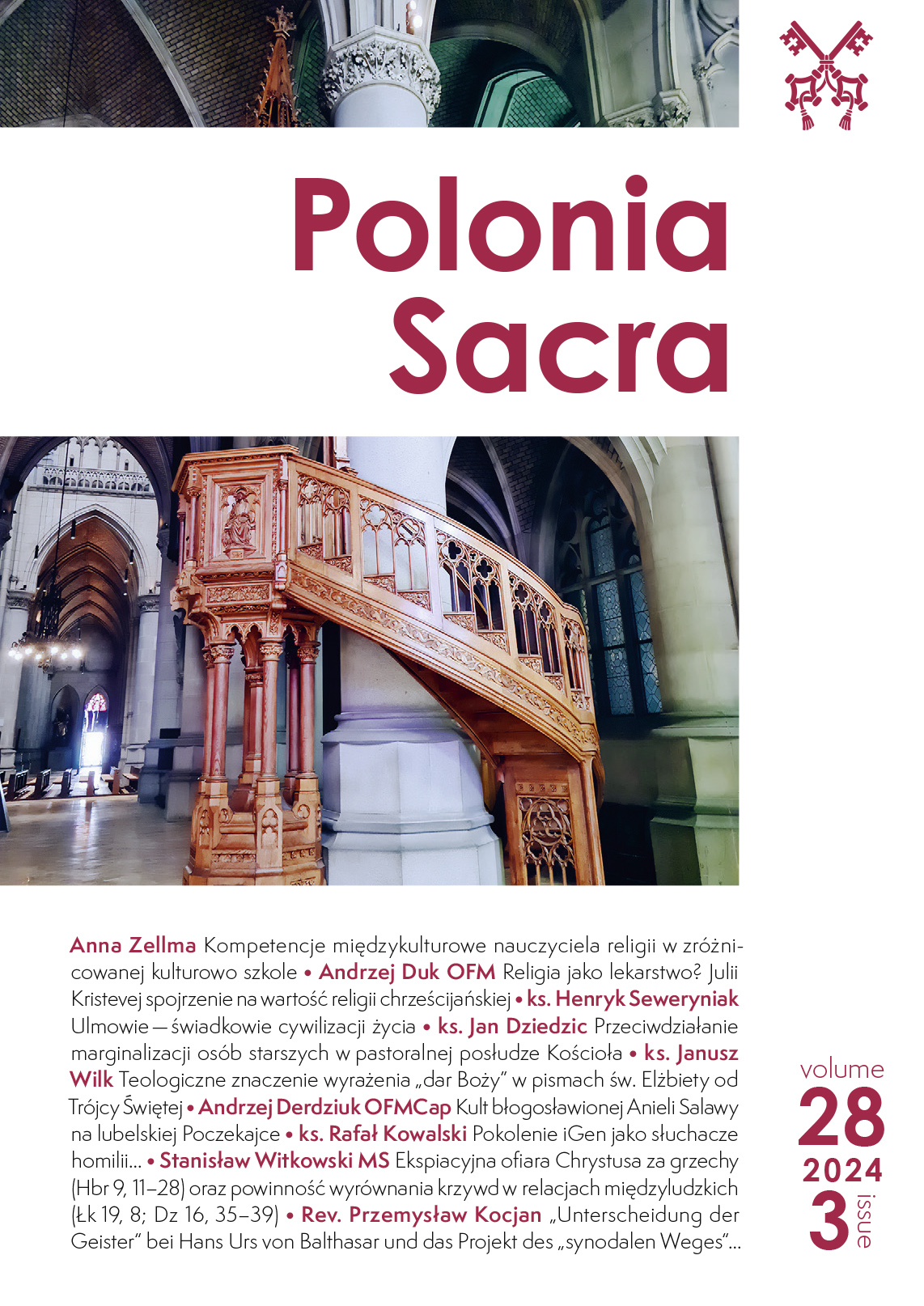Religia jako lekarstwo? Julii Kristevej spojrzenie na wartość religii chrześcijańskiej
DOI:
https://doi.org/10.15633/ps.28302Słowa kluczowe:
Julia Kristeva, kultura współczesna, postmodernizm, psychoanaliza, religia chrześcijańskaAbstrakt
Wśród humanistów reprezentujących szeroko pojęty nurt postmodernistyczny można dostrzec postawę uznania względem fenomenu religii. Do grona pozytywnie nastawionych do religii autorów postracjonalnych należy Julia Kristeva, francusko-bułgarska psychoanalityczka, filozofka i literaturoznawczyni. Jej nieskrywany szacunek do treści, które niesie religia chrześcijańska, wzbudza niekiedy zachwyt także wśród wierzących. Rodzi się nawet obustronne oczekiwanie, że pod wpływem jej prac pojawić się może przestrzeń do budowy nowego świata, wolnego od wszelkich barier i niezrozumienia, a nawet nadzieja na odnowienie chrześcijaństwa. Niestety, po głębszej analizie myśli francuskiej humanistki trudno jest podzielać podobne oczekiwanie. Jej idealistyczna i redukcjonistyczna filozofia nie jest w stanie oddać w pełni chrześcijańskiego przesłania, co oznacza, iż dialog w szerszym wymiarze staje pod znakiem zapytania. W artykule omówiono podstawy jej psychoanalitycznej myśli, jak również dokonano analizy niektórych terminów interpretowanych przez nią, zaczerpniętych z religii chrześcijańskiej. Z przeprowadzonych badań wynika, iż Kristeva nie wychodzi poza ramy psychoanalizy, co powoduje, że stosowane przez nią pojęcia pozornie tylko odpowiadają terminom chrześcijańskim. Dla niej religia jest niczym więcej, jak tylko pewną formą lekarstwa w określonych sytuacjach, co bez wątpienia deprecjonuje chrześcijańskie orędzie.
Bibliografia
Astell A. W., Telling Tales of Love: Julia Kristeva and Bernard of Clairvaux, „Christianity and Literature” 50 (2000) no. 1, s. 125–148.
Bator J., Julia Kristeva — kobieta i „symboliczna rewolucja”, „Teksty Drugie” (2000) nr 6, s. 7–26.
Bonowicz W., Jak Pan to robi, https://www.tygodnikpowszechny.pl/jak-pan-to-robi-16130 (16.11.2023).
Chapman S., Routledge Ch., Key thinkers in linguistics and the philosophy of language, Oxford 2005.
Czarnacka A., Koncepcja podmiotu w teorii Julii Kristevej — próba rekonstrukcji, Białystok 2007, s. 107–114 (Idea. Studia nad Strukturą i Rozwojem Pojęć Filozoficznych, 19).
Dobner C., Wywiad z Julią Kristevą, „L’Osservatore Romano” wyd. pol. (2015) nr 3–4, s. 54–55, https://opoka.org.pl/biblioteka/T/TS/swieci/or201503-teresa500a (02.05.2023).
Duk A., Postmodernistyczne „boje” z religią — próba zarysowania problemu, „Analecta Cracoviensia” (2021) nr 53, s. 7–29.
Freud Z., Kultura jako źródło cierpień, przeł. J. Prokopiuk, Warszawa 1995.
Freud Z., Totem i tabu, przeł. J. Prokopiuk, M. Poręba, Warszawa 1993.
Hawthorne S., An Outlaw Ethics for the Study of Religions: Maternality and the Dialogic Subject in Julia Kristeva’s „Stabat Mater”, „Culture and Dialogue” 3 (2015) Issue 1, s. 127–151.
Jaksender A., Akt estetyczny w ujęciu Jacques’a Lacana i Julii Kristevej, „Zeszyty Naukowe Towarzystwa Doktorantów Uniwersytetu Jagiellońskiego. Nauki Humanistyczne” (2011) nr 3 (2), s. 71–77.
Knapek R., Bóg ateistów, http://artpapier.com/index.php?page=artykul&wydanie=110&artykul=2517 (13.06.2023).
Kitliński T., Obcy jest w nas. Kochać według Julii Kristevej, Kraków 2001.
Kolarzowski J. J., Kristeva, czyli mosty zamiast murów, https://kulturaliberalna.pl/2010/04/20/kolarzowski-kristeva-czyli-mosty-zamiast-murow/ (06.06.2023).
Kristeva J., Au commencement était l’Amour. Psychanalyse et foi, Paris 1985.
Kristeva J., Czarne słońce: depresja i melancholia, przeł. M. P. Markowski, R. Ryziński, Kraków 2007.
Kristeva J., Etrangers à nous-mêmes, Paris 1991.
Kristeva J., La révolution du langage poétique, Paris 1974.
Kristeva J., Potęga obrzydzenia: esej o wstręcie, przeł. M. Falski, Kraków 2007.
Kristeva J., Pouvoirs de l’horreur, Paris 1983.
Kristeva J., Pouvoirs et limites de la psychanalyse, vol. 1: Sens et non-sens de la révolte, Paris 1996.
Kristeva J., Psychoanalysis and the Polis, transl. M. Waller, „Critical Inquiry” 9 (1982) no. 1, s. 77–92.
Kristeva J, Stabat Mater, transl. A. Goldhammer, „Poetics Taday” 6 (1985) no. 1–2, s. 133–152.
Kristeva J., Ta niewiarygodna potrzeba wiary, przeł. A. Turczyn, Kraków 2010.
Kristeva J., Thérèse mon amour, Paris 2008.
Kristeva J., Vanier J., (Bez)sens słabości: dialog wiary z niewiarą o wykluczeniu, przeł. K. i P. Wierzchosławscy, Poznań 2012.
Kupczak J., Ta niewiarygodna potrzeba wiary, https://repozytorium.theo-logos.pl/xmlui/bitstream/handle/123456789/3277/Kupczak_Kristeva_Ta_niewiarygodna_potrzeba_wiary_Recenzja.pdf?sequence=1 (16.11.2023).
Lacan J., Le moi dans la théorie de Freud et dans la technique de psychanalyse, Paris 1978 (Le Séminaire, 2).
Lampe K., Kristeva, Stoicism, and the „True Life of Interpretations”, „Substance” 45 (2016) no. 1, s. 22–43.
Loba M., Wierzyć według Edyty Stein, Poznań 2014, s. 123–131 (Zeszyty Naukowe Centrum Badań im. Edyty Stein, 11).
Makowski J., Julia Kristeva, „Ta niewiarygodna potrzeba wiary”, https://www.dwutygodnik.com/artykul/1077-julia-kristeva-ta-niewiarygodna-potrzeba-wiary.html (16.11.2023).
Maritain J., Freudianism and psychoanalysis: a Thomist view, w: Freud and the 20th century, ed. B. Nelson, New York 1957, s. 230–258.
O psychoanalizie, http://psychoanaliza.org.pl/psychoanaliza/ (01.12.2022).
Rawski J., Gorsząca inność. Dziecko jako abiekt, „Annales Universitatis Paedagogicae Cracoviensis. Studia de Cultura” 4 (2012), s. 95–104.
Podgórski R., Filozofia fenomenologiczna Maxa Schelera i Romana Ingardena w „Antropologii adekwatnej” Karola Wojtyły, „Studia Ełckie” 19 (2017) nr 3, s. 267–281.
Rieff P., Freud: the mind of the moralist, New York 1959.
Stróżyński M., Psychoanaliza i chrześcijaństwo wobec przemian współczesnej kultury, w: Kulturowe paradygmaty końca: studia komparatystyczne, red. J. C. Kałużny, A. Żywiołek, Częstochowa 2013, s. 85–105.
Tarnowski K., Usłyszeć niewidzialne. Zarys filozofii wiary, Kraków 2005.
Tużnik M., Problem abiekcji w kulturze, „Kultura i Wartości” (2016) nr 19, s. 117–137.
Wojtyła K., Ocena możliwości zbudowania etyki chrześcijańskiej przy założeniach systemu Maksa Schelera, Lublin 1959.
Volat H., Julia Kristeva: Bibliografia, https://hvolat.com/Kristeva/krist01.htm (16.11.2023).
Pobrania
Opublikowane
Numer
Dział
Licencja
Prawa autorskie (c) 2024 Andrzej Duk

Utwór dostępny jest na licencji Creative Commons Uznanie autorstwa 4.0 Międzynarodowe.
Autorzy publikujący w czasopiśmie udzielają jego wydawcy zgody o następującej treści:
- Autor zachowuje autorskie prawa majątkowe do utworu, a jednocześnie udziela wydawcy czasopisma zgody na jego pierwszą publikację w wersji drukowanej i wersji online na licencji Creative Commons Uznanie autorstwa 4.0 Międzynarodowe oraz zgody na wykonywanie opracowań, w tym przekładów.
- Autor ma możliwość udzielania zgody niewyłącznej na opublikowanie utworu w wersji, która ukazała się w czasopiśmie (np. zamieszczenia go w repozytorium instytucjonalnym lub opublikowania w książce), wraz z informacją o jego pierwszej publikacji w czasopiśmie.
- Autor może umieścić swój utwór online (np. w repozytorium instytucjonalnym lub na swojej stronie internetowej) jeszcze przed zgłoszeniem utworu do czasopisma.

